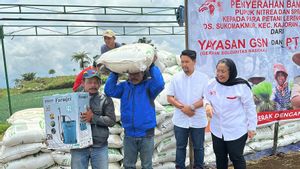JAKARTA - A serological survey revealed that some people in DKI Jakarta have been exposed to COVID-19. In addition, the survey conducted by the FKM UI Pandemic Team, the Eijkman Institute, and CDC Indonesia also revealed that women and obese people are more easily exposed to the virus.
The serological survey was carried out on a population-based basis with a sampling method, in the period 15-31 March and was carried out in 100 urban villages in 6 administrative cities/districts covering 4,919 samples.
"In terms of gender, women are 47.9 percent higher and men 41 percent," said Pidemiologist from the FKM UI Team, Pandu Riono in an online discussion, Saturday, July 10.
He also explained that this virus is almost spread in all age groups. "So it's not true that we only talk about the elderly. But this is all the population, including children, we are worried that more and more people are starting to become infected, have symptoms, and die," he said.
As for the area of residence, Pandu said that people in the Central Jakarta area were most exposed or reached 53.7 percent. While the lowest is the Thousand Islands, which is around 39 percent.
This, he continued, should be an illustration for the DKI Jakarta Provincial Government if the highest population mobility occurs in the Central Jakarta area because there are many offices.
Furthermore, Pandu also explained that unmarried people reported the lowest exposure to COVID-19. "While the taller one is married. There is no explanation for this, but it does describe the portrait situation in March and the residents at that time," explained Pandu.
From this survey, it is known that people who live in slum areas have a higher potential for exposure to COVID-19 with a percentage reaching 48.4 percent. Meanwhile, those who live in non-slum areas are exposed to 37.5 percent.
Finally, Pandu said that people who are overweight or obese tend to be exposed to COVID-19. This is based on the characteristics of the samples they obtained.
Where when the examination was carried out, they not only took antibody samples but also checked weight and height.
"It turns out that people who are fatter have a higher infection rate," he concluded.
The English, Chinese, Japanese, Arabic, and French versions are automatically generated by the AI. So there may still be inaccuracies in translating, please always see Indonesian as our main language. (system supported by DigitalSiber.id)













